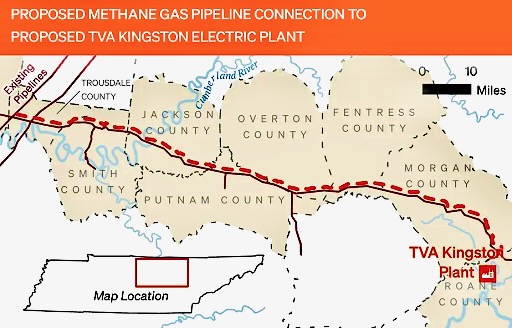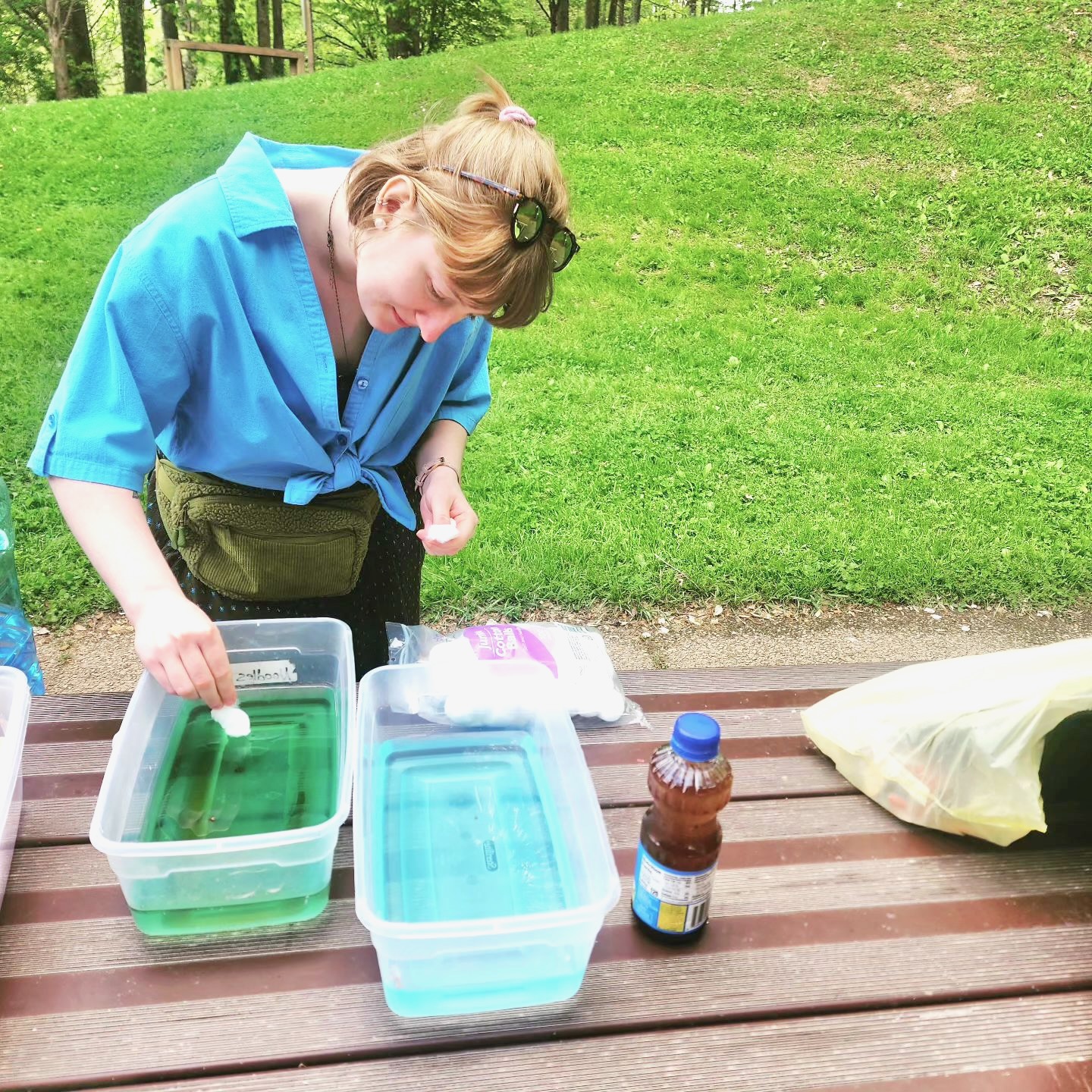Lorelei Goff | June 29, 2023 | 1 Comment

Tennessee Valley residents gathered in December 2022 at Hix Farm Brewery for a People’s Town Hall meeting. Organizers arranged the meeting to provide area residents with information about the proposed Ridgeline Pipeline. Photo by Gabrielle Lichtenstein.
The adage, “There is strength in numbers,” perhaps nowhere rings truer than in the fight against the fossil fuel industry for private residents to retain their land rights. When individuals who may be bewildered and intimidated by industry tactics find common ground, their strength and power grow exponentially.
SAGE TN, which stands for Safe, Affordable, Good Energy for Tennessee, is a budding grassroots group formed by diverse members of a community coming together to amplify their voices and effect change. Breanna Ortner helped found the group after learning the Tennessee Valley Authority’s Ridgeline Pipeline Expansion project was set to impact where Ortner and their partner live and hike.
The proposed pipeline expansion route would begin at the Texas Eastern Natural Gas line in Trousdale County and run parallel to the existing East Tennessee Natural Gas pipeline through parts of Smith, Jackson, Putnam, Overton, Fentress and Morgan counties, ending at the Tennessee Valley Authority’s proposed gas-fired power plant that would replace the Kingston Fossil Plant in Roane County. The existing coal-fired power plant, which would be replaced by the new gas plant, became infamous for the 2008 coal ash spill, one the worst human-caused disasters in United States history. A gas compressor station would be constructed at the split from Texas Eastern in Trousdale County.

The red dashed line shows the proposed route of the Tennessee Valley Authority’s Ridgeline Pipeline Expansion. Solid lines depict existing pipelines. Image courtesy of Southern Environmental Law Center
“I got involved in this pipeline fight, before SAGE even existed,” says Ortner, who uses the pronouns they, them and theirs. “We made SAGE come into being because of this pipeline fight.”
“We saw a sign that said ‘No TVA Pipelines’ and we were like, ‘Oh, what’s
that about? We don’t know anything about a pipeline,’” they explain. “‘Is this pipeline possibly going through near us?’”
A scoping meeting about the pipeline, hosted by the Federal Energy Regulatory Commission, left residents with more questions than answers. Ortner describes that meeting as “more like a pitch from Enbridge,” saying many attendees felt the company wasn’t forthcoming with information. Enbridge is the pipeline company behind the Ridgeline project and is headquartered in Canada.
“We felt like [Enbridge and the Federal Energy Regulatory Commission] weren’t really answering our questions and that we were more sort of being stonewalled,” Ortner says.
“We were really frustrated and out of that frustration, me and a couple of other local organizers put a people’s town hall together,” Ortner adds. “We did our own research and we brought in other organizers who had more information.”
Those organizers included staff with Sierra Club and Appalachian Voices, the organization that publishes The Appalachian Voice.
“Having those folks who have the tools and the resources and the time to help us make sure all of our ducks are in a row, like all of our forms have been filed and everything has been turned in on time has been immensely helpful,” Ortner says. “Also, just in securing us grant money. One of the Appalachian Voices employees has been immensely helpful in the whole grant-writing process and getting us through grant writing, just to make sure that SAGE TN is funded.”
One of those questions Ortner says hasn’t been answered by Enbridge is who will have to pay if a leak happens.
“This pipeline is going through a very rural area,” they explain. “Most of these people are not on city water or county water.”
Ortner wonders who will be responsible for cleaning up wells around the pipeline, if they become contaminated.
“Who’s on the hook for cleaning that up?” they ask. “Who’s on the hook for putting them on city water or county water? That’s thousands upon thousands of dollars. Do we send the bill to Enbridge? Do we send the bill to TVA? Is the homeowner on the hook for this?”

Members of SAGE TN and other concerned residents of the Tennessee Valley stand in solidarity as J. T. Neal of Nashville reads a petition submitted by SAGE TN, the Clean Up TVA coalition and other grassroots groups at the Tennessee Valley Authority’s board of directors listening session in May. Photo by John Todd Waterman
Other concerns include the acceleration of climate change by continued fossil fuel energy buildouts, damage to ecosystems and water quality from the construction process, the potential for even more catastrophic impacts to soil and water if there are pipeline leaks or explosions, in addition to the risk to human safety and structures if there are explosions. The group is also worried about damage to the historically and geologically important Flynn Creek Impact Crater and increased electric rates for consumers due to the expense of the pipeline and associated infrastructure. The gas buildout would also create a fraction of the jobs that clean energy could provide, according to a recent analysis by Appalachian Voices for a TVA gas plant of about the same size.
The group grew organically as word spread, drawing people from across demographic lines, including political affiliations. The group has organized a town hall, hosted a picnic, and raised awareness in the local media and at community events. A free film series will kick off the group’s summer events.

SAGE TN member Moss Keith participates in a learning activity about the importance of keeping pollution out of our water. SAGE TN has organized a number of community learning opportunities to raise awareness about the potential hazards of the Ridgeline Pipeline Expansion. Photo by Erin Walker
“We definitely represent multiple political viewpoints,” Ortner says. “We are also not a political group although some members, including myself, have strong political opinions. We’re more of a coalition of ideas.”
SAGE TN member Erin Walker fears the pipeline will ruin her livelihood. An herbalist who leads foraging and educational hikes in the area, Walker chose the location for its biodiversity. She says many others also use the area, including scientists and teachers of biology, geology and photography.
After supporting other environmental groups through donations and signing petitions in the past, she felt obligated to take a more active role now that a crisis is at her own door.
SAGE members expect a tough fight. Even though gas-fired power plant failures were a cause of TVA’s Christmas Eve 2022 blackouts, while renewables worked well, Ortner sees the belief that solar and wind power cannot be reliable as one challenge the group will have to overcome. Another will be debunking the idea promoted by fossil fuel companies that methane gas is a climate change solution.
“What we’re talking about is methane gas and methane gas is a harmful pollutant that releases tons and tons and tons of [greenhouse gas] into our atmosphere every single year,” they say.
Ortner describes Enbridge’s tactics as bullying to make landowners feel they have no choice in the matter.
“None of this is a done deal,” they say, pointing out that the approval process for the pipeline is still in the permitting stage.
SAGE is gathering public comments on TVA’s Draft Environmental Impact Statement for the Kingston plant retirement. Comments will be accepted through July 3. Another key public comment period will open in July or August, after Enbridge submits a formal application to the Federal Energy Regulatory Commission.
“This upcoming period will be especially important for landowners and other directly impacted folks, who can apply to intervene in the process,” says Appalachian Voices’ Tennessee Energy Democracy Field Coordinator Gabi Lichtenstein. “This will give them more rights later on.”
While the group doesn’t count any big wins yet, they are moving forward, with more than 40 landowners stepping up to oppose the pipeline.
The fight will be a long one. Members of SAGE TN have talked with other groups opposing pipelines around the country. They’ve been told to expect a years-long fight.
“So we’re definitely in it for the long haul,” Ortner says.
Walker says she feels hopeful they can win.
“I feel like SAGE has grown into a much bigger thing than I had expected it to be,” she says with pride.
She adds, “Enbridge knows who we are, which is good.”

The Tennessee Valley Authority is proposing the largest buildout of methane gas infrastructure in the nation. As part of this effort, TVA seeks to replace the coal-fired Cumberland power plant with two gas-fired power plants in Cheatham and Stewart counties, Tennessee.
Gas company Kinder Morgan is proposing to build two fracked-gas pipelines across a combined 44 miles in Cheatham, Dickson, Houston and Stewart counties to feed the power plants.
Opposition to these proposals is growing. The recently formed Cumberland Preservation Group is pushing back against TVA’s gas buildout in Middle Tennessee in partnership with other community groups like Promise Land Heritage Association and Cumberland Furnace Community Center, supportive residents and local officials, and established environmental groups including Appalachian Voices, Sierra Club, Southern Environmental Law Center and other members of the Clean Up TVA Coalition. Learn more at AppVoices.org/CumberlandPlant.
Like this content? Subscribe to The Voice email digests
The Tennessee Valley Energy Consumers Group is also concerned about the TVA shift to natural gas. Our objective is reliable electric power at the lowest cost and natural gas is neither reliable or low cost. TVECG is submitting comments both in the TVA IRP process and the EIS process. See https://www.tvecg.com
Representing consumer interests, we look at the total electric bill. But TVA just passes through fuel costs directly to power bills putting all the fuel cost risks on consumers. TVA management objectives and pay are based on minimizing non-fuel costs and specifically exclude fuel costs. Given that objective function, natural gas always wins with its low non-fuel cost but high fuel costs.
TVECG has obtained a system planning model and we are running our own planning studies for the TVA region with the objective function of least total cost on the consumer bills, including fuel costs. Very early results indicate that likely TVA has already gone too far with natural gas expansion. TVECG invites all interested parties of whatever view to participate in our collaborative studies.